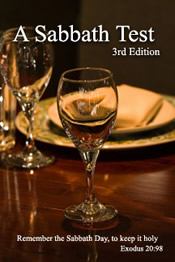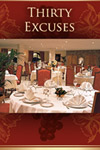


Argument II
A Complex World
There is a way that seems right to a man,but the ends thereof are the ways of death.
Proverbs 14:12
When giving a sermon regarding the proper observance of the Sabbath, a prominent minister in the Church of God addressed the issue of going to restaurants on this day. It was clear from his message that he saw nothing wrong with this practice. At one point, this pastor actually suggested that the complex nature of our world today makes it impossible to keep the Sabbath as prescribed in the scriptures. He specifically noted God’s instructions regarding buying and selling.
This man did not dispute the fact that in the Old Testament, buying and selling on the Sabbath went contrary to the scriptures. However, based on the nature of our contemporary world, not buying and selling would be so impractical as to actually be a stumbling block to God’s people.
According to this pastor, God’s people today often buy and sell on the Sabbath without even realizing it. He cited as proof the fact that most homes in the modern world are equipped with utilities such as gas, electricity, and water. This minister contended that as a result of using these services on the Sabbath, God’s people not only pay for them, but also make it necessary for utility companies to support their service with manpower on this day – a practice which technically violates God’s instruction prohibiting others such as “the stranger within thy gates” (Ex. 20:10) from working on behalf of His people on the Sabbath.
This highly respected minister has advanced a very unusual stream of logic in his argument. His reasoning is based on the premise that because you do not have authority over that which is beyond your control, you do not have to exercise such authority over that which is within your control. Therefore, buying and selling on the Sabbath is permissible in today’s world. It is interesting that this identical argument has been used prolifically by the Protestant world as justification for not keeping the Sabbath at all.
Rationalizing a Tradition
It is difficult to regard this argument as anything other than an attempt to rationalize a practice that is nowhere supported in scripture. In essence, it is using technology and progress to invalidate God’s word. Following this argument to its logical conclusion, this minister is suggesting that if the world during the days of Nehemiah was as technologically advanced as it is today, Nehemiah would never have prohibited vendors from entering into Jerusalem and selling their goods on the Sabbath. Does anyone really believe this would be the case?
To illustrate how foolish such an argument is, consider how it could be used with respect to eating unclean foods. The argument would go something like this: Because all foods at restaurants are prepared on common working surfaces, clean foods might come in contact with unclean foods. Therefore, it is possible that microscopic particles of unclean meats may attach themselves to the steak you just enjoyed at that five star restaurant. This being the case, you might as well order lobster because you probably had some of it with the meal you just finished.
Would such an argument ever persuade you to order a ham sandwich the next time you go to a restaurant? Of course not! Because it is obvious that God expects His people to exercise authority over things they can control, not things they can’t. The choice of what you eat as well as when you eat it falls within that control. If you wouldn’t eat a ham sandwich because God’s law forbids it, why would you buy and sell on His Sabbath – which is forbidden by the same God?
The plain truth regarding eating out at restaurants on the Sabbath is revealed not only in the words of Nehemiah, but also in the example of God’s people throughout the Bible. There is not a hint in the scriptures that any of the champions of the faith ever engaged in such a practice.
What About the Disciples Picking Grain on the Sabbath?
Matthew 12:1-8
There are some in the Church who believe Jesus’ disciples picking a small amount of grain on the Sabbath (Mt. 12:1-8) stands as proof that acquiring a meal outside the home does not violate God’s Law. Some even contend that the Old Testament made provisions for the poor and travelers to do just that (see: Lev.19:9, Deut. 23:25, 24:19). However, Jesus implied just the opposite when defending His men. To illustrate this point consider the following. If what the disciples did was lawful, why would the Messiah cite the examples of David and the Levites in their defense? Jesus readily acknowledged that both David and the Levites did that which went contrary to God's law (Mt. 12:3-5). If this wasn't also true of the disciples, why did Christ invoke these particular examples? Why didn't He simply argue that no law had been violated?
Something to Think About
At this point, it is important to understand that although the Pharisees accusing the Messiah’s disciples, were treacherous, they weren't stupid. These men were acutely aware of the provision in the Torah permitting gleaning on another man's property. However, they also knew that this provision did not extent to gleaning on the Sabbath, regardless of how little was gathered—and Jesus understood this as well.
Furthermore, contrary to what many may believe, Jesus never challenged the Pharisees' understanding of the law, but rather their understanding of MERCY. The truth that seems to be so elusive to so many today is that the Messiah considered His disciples "guiltless," not because of what they did, but because of why they did it. These men were genuinely famished, just like David—and like David, what was done to remedy it was unquestionably a once-in-a-lifetime act, not something that could be planned out and done periodically, as so many do today.
How Hungry were the Disciples?
The actual story of David and the Showbread provides some keen insight into what may have been taking place when Jesus defended His disciples against the accusation leveled by the Pharisees. It most assuredly makes a powerful statement regarding dining out on the Sabbath. Consider the following.
When David ate the showbread he didn’t simply take it and start eating. He first approached the priest and asked for permission to do so—and he had a very good reason for asking. The scriptures tell us that at that time David was being pursued by King Saul who wanted to kill him. His flight required him and his men to hide out in order to avoid capture and certain execution. In all likelihood, their escape was so swift they didn’t have time to take provisions with them. Some commentaries suggest that they may have gone 3 days without food when David finally sought out the priest for help. Jamison, Fausset and Brown’s commentary describes David’s plight as “an emergency.” They would go on to write:
“David and his attendants seem to have been lurking in some of the adjoining caves, to elude pursuit, and to have been, consequently, reduced to great extremities of hunger.”
In short, they were famished. This was not a simple case of the “munchies.” Nor were they looking for a nice place to fellowship. Their need was REAL. And their situation was desperate.
However, even then David sought the permission of the priest before taking the showbread. And although his need was truly GREAT, Ahimelech, the priest, still inquired of God as to whether he could give David the food. The scriptures tell us that God showed mercy to David and consented. JFB put it this way.
“A dispensation to use the hallowed bread was specially granted by God Himself.”
This now bring us to an important question. Why would Jesus invoke the story of David at this time if it didn’t parallel, to some degree, what was taking place with the disciples? After all, if the need of the disciples wasn't comparable to that of David and his men, the analogy wouldn't work. In other words, if what the disciples did was simply a part of a normal Sabbath day then their reason for plucking the grain would have been driven by convenience while David's reason was driven by desperation. It is interesting that the word used to describe the disciples hunger (Mt. 12:1) was the same used to describe the hunger experienced by David (v. 3). It was also the same word used to describe the Messiah's condition when he fasted for forty days and forty nights in the wilderness (Mt. 4:2)
Based on Jesus' invocation of this story, it is reasonable to conclude that what the disciples were experiencing was truly unique. This was not a typical Sabbath in which these men were simply acquiring a normal meal. These men were genuinely hungry, perhaps even famished. You don’t know why, but like David, they must have had a very good reason for having not eaten. As a result they inquired of the Messiah to see if they could gather a small amount of grain to eat. Jesus consented.
The bottom line is this. God's judgment of David as well as His judgment of the apostles was based on a unique circumstance at a unique time. For Sabbath dining advocates to hold this example as proof that God’s people may now make plans to pay Sabbath-breakers to prepare their meals on holy time and also be held guiltless is disgraceful. In a very real sense such a belief turns the grace of God into license. In other words, it rejects the true meaning of the words "I desire mercy and not sacrifice," and represents them to mean "If you can acquire your Sabbath food once, because of a genuine need, then I can do it on occasion because of the pleasure I derive from it.” In a sermon defending Dining out a long standing pastor of major COG actually referred to dining out on the Sabbath as a “treat.”
Do you think that is why David ate the shewbread?
Or, why the disciples picked grain?
The assertion that it has always been permissible with the Lord of the Sabbath for God's people to acquire and prepare their Sabbath meals on holy time is thoroughly contradicted by the Lord of the Sabbath Himself. Jesus never taught any such thing, nor did He imply it—in either word or deed.

